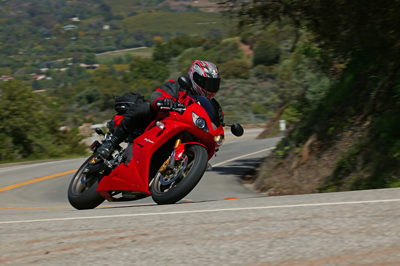
|
I’ve been riding a motorcycle—on and off but more on than off—for forty-four years. It is a whole body experience, much more than driving a car or even riding a bicycle. A motorcycle is like Harry Potter’s broom, moving with the speed of thought and requiring you to gauge every curve, every obstacle in the road, the nearness of every car, the gap between fenders if you are splitting lanes, and a dozen other things that happen practically all at once.
One of the things motorcycle riding teaches you is to perceive and move now.1 When you are approaching a curve at fifty miles an hour, and your balance—your very life—depends on making the correct adjustments to throttle speed, front and rear braking, handlebar position and force inputs, distribution of your body weight, choice of apex and your route through the curve to stay in your lane and avoid obstacles like gravel, potholes, and dead animals … you don’t have time to sit down and figure things out. In three seconds or less, you are going to be committed to making the maneuver. If you try to stop, jam on the brakes, or in any way reject the oncoming maneuver, you are going to be in a much worse place, with possibly catastrophic results, than if you miscalculate or misapply any of the above variables.
In such a position, you cannot wish that you were anywhere else, or that the choices before you were something other than what they are. You don’t have the luxury of time to decide. You don’t have the option of a do-over, or taking a mulligan, or apologizing to the gods of speed, balance, gravity, and tire adhesion. You are in the maneuver, and all you can do is face it, make your best approach, and ride it through.
This is one of the things that makes motorcycle riding so exhilarating, so much more a confirmation of life and skill than driving a car or riding a bicycle. You are in the moment, your life is on the line—figuratively and literally—and you have no choice but to succeed. If you stopped and thought about it, paused to dwell upon the consequences of a bad maneuver in terms of broken bones and abraded skin, if not concussion and death, you would probably not be there. But since you are there, you must put those thoughts and fears aside, swallow your heart, and ride it through. The moment is now, and the action is irretrievable.
There must be other experiences that match this: perhaps landing an airplane, hitting a fastball, throwing a long pass, or blocking a punch. These actions all have points in time that require you to commit to your skill and follow through. But even in these moments, you know that you have options. The airplane pilot can always apply power at the last second before the wheels touch down, fly out of a bad landing, and go around for another pass. The hitter with two strikes or less scan usually let the fastball go by and wait for another pitch which might be better. The quarterback can fake the pass and try a running play. The fighter can duck his head or even let the blow land, because a punch to the face is not likely to be lethal.
But life itself offers us many immediate and irredeemable moments. These are sudden choices, like rounding a curve at speed on a motorcycle, like facing a collapsing bulkhead in Lord Jim, where we have only a second or two to make a decision, with consequences that may affect and alter the rest of our lives, and then ride it through.
In the moment that you are offered a deal—like landing a new job that will require you to relocate, or a contract whose fulfillment will call for more effort or time or money than you were prepared to give, or a new house that is more space and upkeep than you planned for, or a mortgage that is more in monthly payments than your budget calls for—you have a sudden decision to make. Sometimes you can say, “Let me think about it,” and go away to discuss the situation with your business partner, your family, you wife. And you believe you can trust that, when the offering party says, “Okay, you think about it,” the parameters of the deal, or the deal itself, won’t change while you’re doing your thinking.
This is the “fish or cut bait” moment. This is the point of commitment. And an honorable person knows that if he or she commits to the deal, there can be no backing out. A person’s word—even if not backed up by oaths, is a bond, a signature is binding, and so is a handshake. The coward or the games player thinks of after-the-fact alternatives: that if things don’t work out, he or she can always get a lawyer, invoke an escape clause, annul the marriage, or just walk away from the obligations and the payments and let a court sort out the breakage. But the honorable person doesn’t have such thoughts. The commitment of a moment, made with a lifetime of careful planning and measuring, is binding for the term of the agreement—or until death do us part.
In this I am reminded of the assessment of managerial style by the majordomo Moneo Atreides in Frank Herbert’s God Emperor of Dune: “The difference between a good administrator and a bad one is about five heartbeats. Good administrators make immediate choices. … They usually can be made to work. A bad administrator, on the other hand, hesitates, diddles around, asks for committees, for research and reports. Eventually, he acts in ways which create serious problems. … A bad administrator is more concerned with reports than with decisions. He wants the hard record which he can display as an excuse for his errors. … Oh, they depend on verbal orders. They never lie about what they’ve done if their verbal orders cause problems, and they surround themselves with people able to act wisely on the basis of verbal orders. Often, the most important piece of information is that something has gone wrong. Bad administrators hide their mistakes until it’s too late to make corrections.”
That is, the good administrator can make a decision, ride through the curve—and have the honorable intention to accept and deal with the consequences. A bad administrator cannot make a decision and will either crash or absent himself—wish himself elsewhere—at the moment of impact.
Life itself offers all of us such moments. How we deal with them is a true test of character.
1. See SIPRE as a Way of Life from March 13, 2011.



